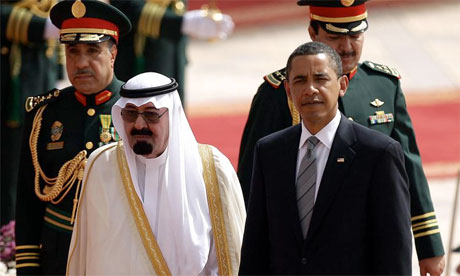WikiLeaks cables: reading between the lines
One message, often buried, comes out loud and clear from the embassy cables: the US should choose its allies more carefully

Among the most arresting lines in the trove of diplomatic cables made public this week was one from King Abdullah of Saudi Arabia. "Cut off the head of the snake," he advised his American friends. Any herpetologist would agree that this is good advice in dealing with a threatening viper. But who is this snake? King Abdullah was referring to Iran, obliquely arguing for a military attack.
Yet, there was another tantalising detail in the trove of cables that suggests the larger threat comes from inside King Abdullah's own country. "Saudi donors remain the chief financiers of Sunni militant groups like al-Qaida," the New York Times reported in its first article on the leaked documents.
That is a huge, though not unsurprising, revelation. It reflects how complex and sometimes self-defeating America's foreign alliances have become. Saudi Arabia is an intimate ally of the United States, yet Saudi money supports the world's most violently anti-American terror network.
This deeply troubling contradiction has its roots in Saudi history and tradition. The regime's survival is based on a deal with the Wahhabi clerics who dominate religious practice in Saudi Arabia – and whose austere brand of Islam is among the world's most reactionary. Clerics agree to support the regime, ignoring both its alliance with infidel America and the notoriously unIslamic lifestyles of its thousands of princes. In exchange, the regime gives these clerics billions of dollars, much of which they use to run mosques and religious schools across the Islamic world. More than a few of these mosques and schools, often run by Saudi clerics or others they have trained, are incubators of terror, where generations of lost boys learn to chant the Qur'an and hate America.
The deal is, as former CIA director James Woolsey once described it, "for the Wahhabis to be given all of the money in the world they could ever remotely dream of needing or wanting to spread their sect's beliefs, and for them to leave the House of Saud alone."
Successive American presidents have turned a blind eye to piles of evidence that Saudi money is being used to foment holy war against America. They have reason to do so. The absolute monarchy that rules Saudi Arabia generously cooperates with American global policies – even agreeing, according to one leaked cable, to supply China with oil in the hope of wooing it away from reliance on Iran. Saudi Arabia supplies much oil to the US. And it is the world's largest consumer of American weaponry.
The Obama administration recently announced a deal to sell Saudi Arabia a staggering $60bn worth of weapons. This is new only in scope. In 1990, the New York Times ran a story headlined "US to Sell Saudis $20bn in Arms; Weapons Deal is Largest in History." Seventeen years later, the same newspaper ran an almost identical headline: "US Set to Offer $20bn Arms Deal to Saudi Arabia and Other Gulf States."
How could President Obama, in the midst of a recession, refuse to sell the Saudis another $60bn worth, given the number of jobs this sale will create? He might argue that it is unwise to send so much highly sophisticated weaponry to a kingdom with an uncertain future. King Abdullah is 86 or 87, and is currently hospitalised in New York. He has no designated successor in the country where Osama bin Laden was born and remains highly popular. Weapons systems the US sold to the Shah of Iran wound up in the hands of Islamic militants who seized power there in 1979; a comparable scenario in Saudi Arabia is hardly impossible.
Obama might also argue that arming a country that arms our enemies endangers American lives. That, of course, would provoke questions about Pakistan, America's other two-faced ally. It is no secret that while Pakistan takes billions of dollars in American aid, most of it military, it arms and supports the Taliban and other violently anti-American groups.
Raising questions about these relationships is difficult. Revising them would require sacrificing short-term convenience for long-term benefits, and the US government is not good at long-term thinking. Yet, as King Hamad of Bahrain told American diplomats in one newly-leaked cable: "The danger of letting it go on is greater than the danger of stopping it." He was talking about Iran, but his wisdom applies at least as well to America's perverted relationships with Saudi Arabia and Pakistan.
King Abdullah, according to another leaked document, was also talking about Iran when he told American diplomats, "The bottom line is that they cannot be trusted." This week's leaks suggest that this truism applies at least as much to his own government, and that of Pakistan, as it does to Iran.
From deep in the vast archive of these leaked documents, a voice cries out to America: look more closely at your allies. Those who served your purpose at one time may now be dangerous enemies.

Oil was playing around $87.00/bbl, today. That will, eventually, translate out to $3.00/gal at the pump ($3.10/gal in the summer blend.)
ReplyDeleteThey supposedly have a couple of barrels of spare capacity (I figure, maybe, a million and a half.) If they do, they're the only country on earth that does.
Everybody, 'ceptin me, and thee, of course, is makin' a lot of money off Saudi Arabia.
ReplyDeleteNot the least being Sean Hannity, and their other political employees at the Wall St. Journal.
We're shipping somewhere around A $ Billion/Day out of country for oil, and oil products Every Day.
ReplyDelete...and we promised we would stop it when Jimmy Carter was president.
ReplyDeleteWhat progress we've made is compliments of a little J. Carter, and a lot of George W. Bush.
ReplyDeleteWhat if Iran turned the former U.S. Embassy into an international peace and religious center for diplomatic discourse and mediation? That might be a gesture Washington could respond to.
ReplyDelete...
Someone has to break the ice before we end up causing each other more pain!
My walk down a lane of bad memories convinced me that we need to work for a better future, not stay mired in the images and rhetorical combats of the past.
All Over Again
Rope Swing
ReplyDeleteWhat in hell are doing down there, Sam???
ReplyDeleteI'm sitting by the fireplace, dreaming.
Dreams are good.
You might break your neck.
ReplyDelete76' and sunny here, Bob. What's the temp there?
ReplyDeleteSam that was awesome. I had a friend as a teenager that lived on the river. His rope only hung from a tree but boy did we have a good time.
ReplyDelete